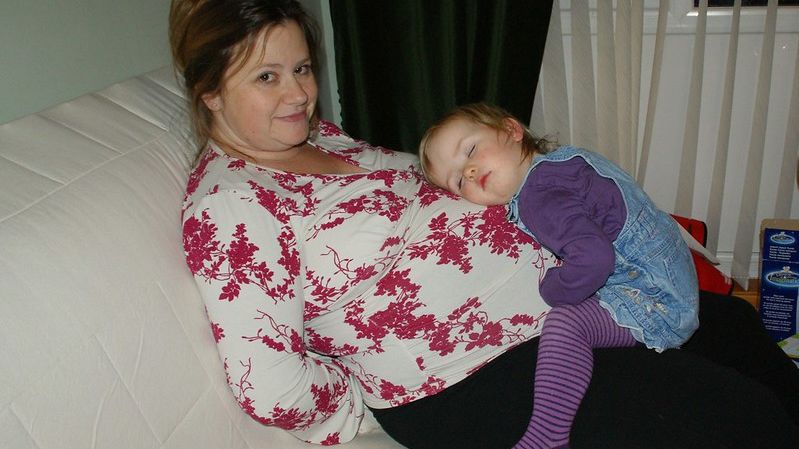Fatigue and Exhaustion

Fatigue is a real and potentially debilitating symptom of pregnancy that has true physiological causes, starting very early in the first trimester.
It is important that women understand how to manage and combat it. This will also greatly improve their ability to cope with other early symptoms of pregnancy, especially nausea and/or vomiting, as well as work, social, and lifestyle changes that may be necessary as a result.
Rest and sleep are essential for a pregnant woman’s mental and physical health, and a restful night sleep is assessed to be more valuable in fighting fatigue than naps during the day. This is critical, as unmanaged fatigue has been linked to longer labor and delivery, cesarean section, and postpartum depression.
Fortunately, fatigue does lessen as pregnancy progresses (around 20 weeks) due to the stabilization of physical, hormonal, cardiac, and metabolic changes that peak earlier in pregnancy.
Pregnant women should considering asking their partner/family to read this section to understand why rest is critical for the health of her pregnancy, especially if the woman is already a parent, employed, or currently lacks the ability to rest during the day or sleep for longer periods at night.
Women (and their partners) should read the below to better understand the exact physiological changes in pregnancy that greatly contribute to fatigue, how to best manage symptoms, and when to call an HCP.
Background
Fatigue is one of the most frequent and persistent complaints reported by pregnant women that greatly affects their everyday lives.
Fatigue leads to mental exhaustion, poor cognitive performance, depressive symptoms, interrupted sleep, and is not always improved with daytime resting.
While some women may experience very little to only mild fatigue, women who experience debilitating states of exhaustion need to contact their HCP.
First Trimester
First trimester fatigue is reported to be so extreme in some women that researchers have even recommended women prepare their work and home environments so they can achieve adequate rest.
Women experience significant energy depletion so early in pregnancy due to an increased requirement for oxygen, an increase in blood volume, cardiac changes, respiratory changes, frequent urination, GI tract changes, nausea, and an increase in appetite, as well as fetal growth and development.

Organogenesis, the period in the first trimester during which most of the fetal organs develop, requires a significant amount of energy from the mother. It is theorized this leads to fatigue, and additional sleep and rest may be an important tactic to conserve energy.
Therefore, the first trimester is commonly associated with increased daytime sleepiness, as well as total sleep time. Pregnant women often take naps in the first trimester; however, although naps may not completely combat this symptom, they may be necessary to keep it from getting worse (see Complications section, below).
Total blood volume during pregnancy increases by about 1.5 liters (almost 40% to 50% increase, or about 1,250 ml) to support fetal and placental development and protection from blood loss during delivery.
This additional volume includes an increase in red blood cells, which carry oxygen throughout the body. This requires adequate iron, folate, and vitamin B12 levels in the mother’s body. A deficiency in any of these necessary nutrients can result in fatigue.
By 8 weeks gestation, the heart pumps about 25% more blood in one minute than before pregnancy. Heart rate also increases, and it takes less effort to become “out of breath” as the cardiovascular system is already working much harder than before pregnancy.
Fatigue can also lead to a feeling of shortness of breath; shortness of breath also peaks in the first trimester, and both fatigue and shortness of breath are generally worsened through a lack of physical exercise (paradoxically). It is possible that despite the heart already working harder, light physical exercise can help pump blood through the body, distribute more oxygen, and help the body adapt to early changes.
Anemia is a well-established cause of a more gradual onset of breathlessness and fatigue that can occur at any time during pregnancy. Anemia occurs when there is a lack of red blood cells in the body to carry oxygen, and may be due to deficiencies in iron, folate, or vitamin B12.
Dehydration is strongly linked to fatigue and research indicates that proper hydration can alleviate some of the causes described above by providing adequate fluid for blood volume increase, avoiding further drops in blood pressure, and improving alertness.

Second and Third Trimester
Fatigue during mid- and late pregnancy has rarely been studied, especially as fatigue usually improves midway through gestation.
Normally, women feel a surge in energy during the second trimester, thought to be a result of hormones stabilizing, overcoming nausea, and the body finally adjusting to the early changes described above.
Extreme fatigue can then return as pregnancy progresses toward delivery: the baby gets larger, oxygen levels increase further, sleep decreases, maternal weight increases, the diaphragm is pushed up, and overall comfort decreases.
Changes to the back and spine, joints, and abdominal muscles in the second and third trimesters can cause muscle fatigue as they adjust to late term physical changes such as weight, change in center of gravity, and instability. This causes increased load on muscles, bones, and joints that do not normally need to work so hard; therefore, women can tire more easily.
Studies have found that 82% to 98% of women in late pregnancy report waking up at night, either due to body discomfort or increased nighttime urination, which also increases fatigue symptoms during the day.
Complications and Management
A lack of rest and/or sleep affects almost every type of tissue and system in the body – from the brain, heart, and lungs to the body's metabolism and immune function – all of which can cause potential complications during pregnancy.
Numerous studies have linked long-term fatigue with prolonged labor and delivery, cesarean section, gestational hypertensive disorders, glucose intolerance, preterm delivery, postpartum depression, diabetes, depression, and obesity.
In non-pregnant individuals, daytime napping improves mood, stamina, and energy levels, but it is unclear if this translates to pregnancy, especially since fatigue during pregnancy is caused by different factors.
A significant amount of research appears to indicate that although pregnant women do need to rest, light to moderate physical exercise may improve fatigue, at least early in pregnancy.

Further, napping alone may not be enough to fully alleviate fatigue. The total amount of sleep that women obtain the previous night has been shown to be more beneficial in improving daytime fatigue and decreasing potential depressive symptoms than daytime napping.
Additionally, if daily fatigue is not tended to, there may be a cumulative effect of fatigue on pregnant women, worsening symptoms.
Action
While women should find time to rest early in pregnancy, light to moderate physical exercise (i.e. walking) may have a better impact on improving fatigue in early pregnancy. Further, women should try to remain hydrated and active to the best of their ability, even a few minutes at at time, which may also help them obtain better sleep at night.
Women should also aim for small, healthy snacks throughout the day to combat low blood sugar and energy levels.
If women are really struggling with fatigue, shortness of breath, and/or nausea and vomiting of pregnancy in the first trimester, they need to call their HCP immediately who can greatly assist. HCPs may also want to rule out any other possible causes for a woman’s severe symptoms.
Women should not hesitate to call their HCP as it is important to avoid symptoms compounding each other. HCPs can help women adjust to these physical changes by assisting in the management of one symptom at a time, providing emotional support, and recommending additional resources should women need them.
Women should also consider sharing and submitting their experience below regarding fatigue and exhaustion during pregnancy. This can help other women learn additional perspectives regarding this concern and recognize they are not alone.
Partner/Support
A woman’s partner/family should try to do what they can regarding extra housework, childcare, and other logistical changes to help her achieve adequate rest – especially at night. This is even more critical if she is also suffering from nausea and vomiting, anemia, and/or a shortness of breath. These factors can compound and potentially lead to physical and mental health concerns later in pregnancy.
Women generally improve by mid-pregnancy, but some women may need additional help coping with these changes, and an HCP can help assist the whole family with improving lifestyle factors that can have a major positive impact for everyone involved.
